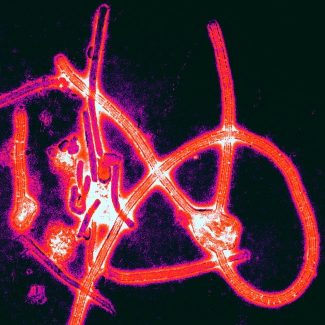Something deadly is creeping across African borders, undetected.
Since February, an Ebola outbreak has spread from the remote southeast of Guinea across the fluid boundaries of West Africa into Sierra Leone and Liberia. 85 new cases were reported in the second week of July alone, helping to push the death toll to just over 600, and increasing pressure on the global health community to bring the epidemic under control.
But it’s not so easy. The early symptoms of Ebola are hardly unique and therefore they are difficult to detect. The most common signs are fever, vomiting, bleeding and diarrhea. As the infection progresses, individuals experience internal bleeding, an inability to clot blood, organ failure, and a shutdown of their immune system.
Ebola isn’t airborne, and it can’t survive for very long on surfaces, but it is highly transmissible through contact with blood or bodily fluids. Once infected, up to 90% of victims die (in the case of the current Ebola outbreak, this rate is around 56%).
The first Ebola outbreak occurred in the 1970s, and it claimed 280 lives. As of mid-June, the death toll of the current outbreak was 350, and it has since almost doubled to 603.
So how does the largest and most deadly Ebola outbreak to date get brought under control? Bart Janssens, director of operations for the medical group in Brussels, says this outbreak is particularly challenging because of the mobility of the infected populations and their proximity to major hubs like the capital cities of Guinea and Libera. The disease can spread more easily than ever with so many outbreak locations and the ease at which individuals can move across borders. Because the virus has a latent period of 21 days, by the time symptoms appear and become contagious many individuals have already crossed a border and brought the virus to another location.
A coordinated response that’s stretched to the limit
What’s more is that international and local medics, such as those from Médecins Sans Frontières (MSF), are experiencing difficulties accessing infected communities. A spokesman from the World Health Organization (WHO) said “It’s very difficult for us to get into communities where there is hostility to outsiders… We still face rumors, suspicion, and hostility.” Many individuals fear that outsiders will spread the disease instead of contain it. Those researching the outbreak have suggested that some infected individuals are being kept secret to avoid hospitalization and the assumed “death sentence.”
Indeed, hospitals are an easy breeding ground for the virus. Low-income countries such as those affected by the outbreak often do not have a strong enough health care systems to deal with such an outbreak. In cases where hospitals or health facilities do not have the resources for proper sterilization methods, the spread of bodily fluids or contaminated blood becomes much more likely.
Where local resources and capacities are limited, organizations like MSF play a significant role in helping to treat patients and control the spread of the virus. However, it has been reported that over 40 international staff members are already on the ground in four treatment centers – a response that, for MSF, cannot be expanded on much more.
Regional economies are being impacted
It’s not just the sick who are suffering. One hotel in Guinea’s capital Conakry reported that at least 80% of their reservations have been cancelled since the outbreak began. Many fear that if it isn’t contained soon, the economic situation will worsen. Senegal has already closed its border, and Côte d’Ivoire is turning away any busses coming from the affected areas. Mohamed Cherif Abdallah, the head of the Organized Group of Businessmen in Guinea stated that the outbreak is having a negative impact on the economy as businesses have begun to lose money and economic activity has all but halted.
Finance Minister Amara Konneh said that the disease will curb economic growth within Liberia, and that there will be a reduction in both customs revenue and investment. As these national economies are destabilized, regional trade and cross-border commerce will also take a hit.
A lackluster international effort?
Given the regional impact that the Ebola outbreak is already having, and what it is still capable of, many feel that the international community has failed to understand the severity of the situation. With no cure or vaccine, medical experts agree that it is absolutely critical to contain the disease before it gets out of control.
Experts are calling for a real political commitment to the reality that this is a major threat to both general health and economic stability. There has been movement in the past month to approach transmission reduction and prevention from many angles. The WHO has been consulting with anthropologists to stop practices such as eating bush meat or embracing deceased Ebola victims at funerals, and at an emergency meeting in Ghana in early July, health ministers representing 11 countries in the affected region adopted a common strategy to respond to the epidemic. They agreed to collaborate more closely in order to ensure the outbreak does not spin out of control. The strategy involves WHO opening a sub-regional control center in Guineau to provide technical support.
As the Ebola virus crosses borders and spreads between countries, it becomes increasingly apparent that this is everyone’s problem. As we saw with the H1N1 outbreak in 2009, a disease can now span the world in a matter of days. What begins as one community’s problem ends up a global concern.




